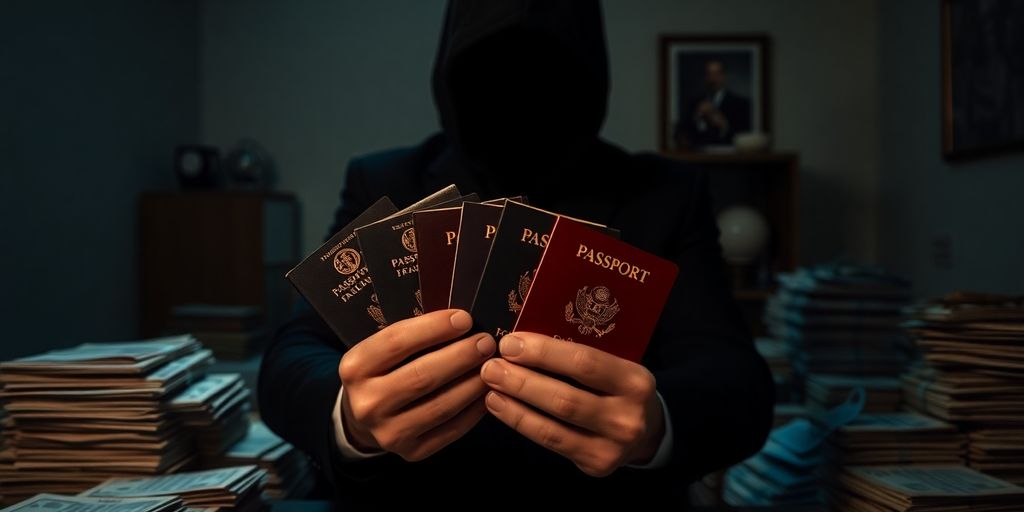In a shocking exposé, investigative reports reveal how Balkan crime syndicates have exploited the fragile institutions of Bosnia and Herzegovina to forge identities and acquire legitimate passports. This alarming trend has allowed violent criminals to operate under false identities, facilitating their criminal activities across borders.
Key Takeaways
- Organized crime groups, particularly the Kavač and Škaljari clans, have obtained Bosnian passports using stolen identities.
- Corrupt officials within Bosnia’s institutions have aided these criminal operations, highlighting systemic vulnerabilities.
- Innocent victims of identity theft face severe legal and personal repercussions, often being mistaken for criminals.
The Exploitation of Fragile Institutions
The investigation, conducted by the Center for Investigative Reporting (CIN), uncovered that between 2013 and 2022, at least 60 members of notorious crime groups successfully acquired Bosnian passports through fraudulent means. These passports enabled them to travel freely, evade law enforcement, and continue their illicit activities.
The criminals primarily targeted unsuspecting Bosnian citizens, particularly those who had emigrated and never updated their identification documents. By using stolen identities, they could create a new life while committing serious crimes under a clean slate.
Insider Support and Systemic Flaws
The operation was not solely reliant on forgery; it was bolstered by a network of corrupt officials. Key figures, such as former police officer Dalibor Ćurlik, played a significant role in facilitating these fraudulent applications. Ćurlik allegedly assisted gang members in navigating the bureaucratic process, ensuring their applications were processed without scrutiny.
The fragmented governance structure of Bosnia, a legacy of the Dayton Peace Agreement, has made its institutions particularly vulnerable to such exploitation. The lack of coordination among various administrative bodies has allowed criminal networks to infiltrate the system with relative ease.
The Process of Identity Theft
The process of obtaining a fraudulent passport typically involved several steps:
- Target Identification: Criminals identified legitimate citizens, often those living abroad without updated ID cards.
- Forged Documents: They created fake ID cards using the names of these citizens but featuring the criminals’ photographs.
- Application Submission: With the forged IDs, they applied for residency papers, citizenship certificates, and ultimately, passports.
This method was employed by both the Kavač and Škaljari clans, with each group establishing its own network of corrupt officials to facilitate the process.
The Human Cost of Identity Theft
The fallout from these criminal activities has been devastating for innocent victims. Many have found themselves flagged as criminals, facing legal challenges and emotional distress. For instance, Predrag Đurđević, a Bosnian citizen living in Serbia, was shocked to learn that his identity had been stolen, leading to police visits and legal complications.
Another victim, Đurađ Trivunović, was detained at the Bosnia-Serbia border due to a red Interpol alert linked to his stolen identity. He was forced to hire legal counsel to prove his innocence, highlighting the severe impact of these crimes on ordinary citizens.
A National Security Crisis
This scandal represents a significant national security crisis for Bosnia and Herzegovina. The ability of organized crime syndicates to obtain legitimate travel documents through manipulation of state systems reveals deep systemic failures that extend beyond individual wrongdoing.
Without urgent reforms to its identification systems and anti-corruption frameworks, Bosnia risks becoming a haven for transnational crime, undermining regional security and tarnishing its international reputation. The challenge is not just bureaucratic mismanagement; it is a matter of national integrity and safety.
Sources
- Balkan crime syndicates exploited Bosnia’s fragile institutions to forge identities and acquire passports –
BLiTZ, BLiTZ – Fears None But God. - Using Stolen Identities, Balkan Gangsters Armed Themselves With Bosnian Passports, Organized Crime and Corruption Reporting Project | OCCRP.






